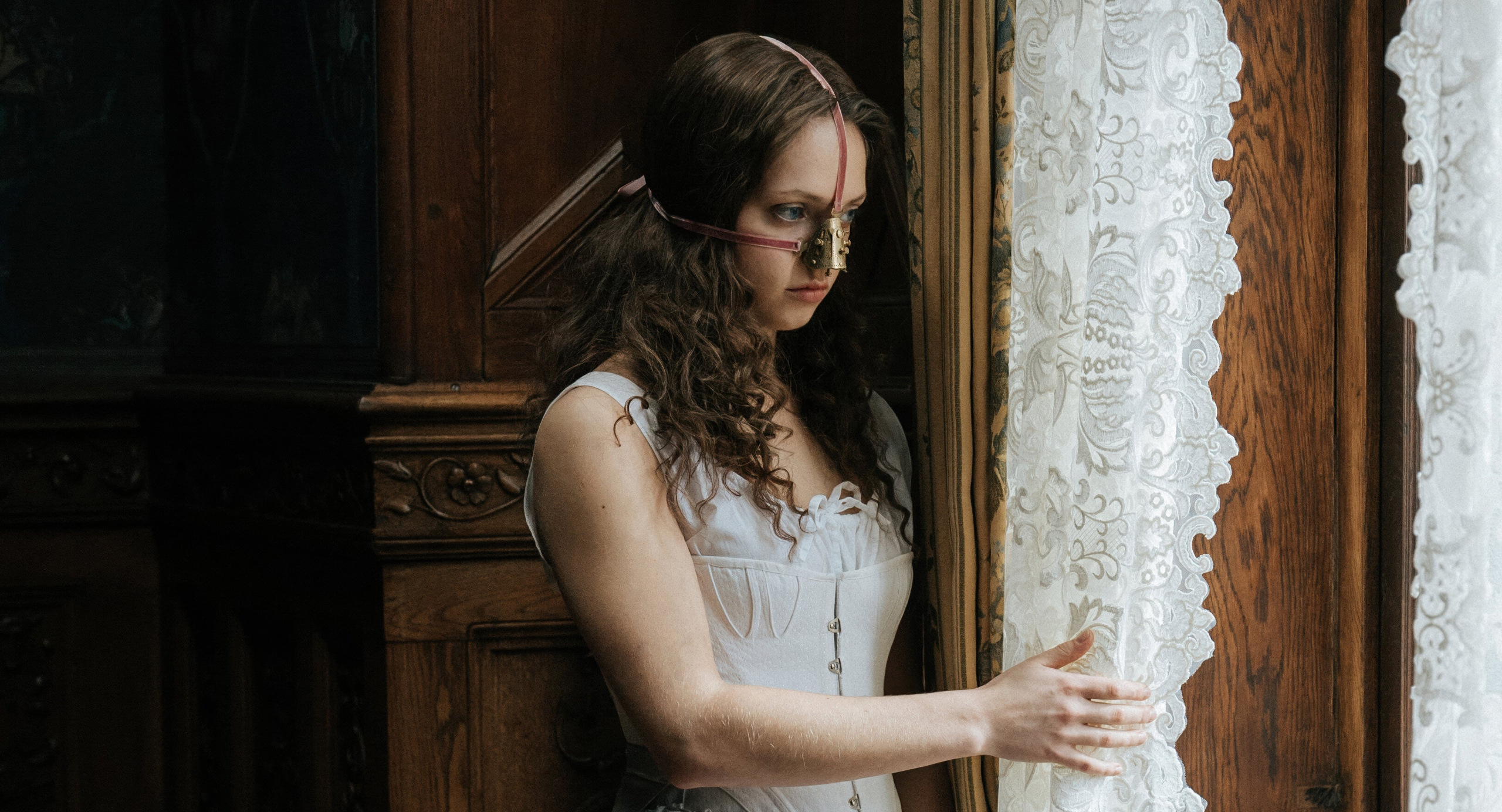The Ugly Stepsister – Film Review
Published May 29, 2025

Emilie Blichfeldt’s The Ugly Stepsister is a skin-crawlingly grotesque and tragically poignant debut that reimagines the classic Cinderella fairy tale as a bloody parable of femininity, envy, and the violent pursuit of idealized beauty. Steeped in the textures of Scandinavian gothic and filtered through the lens of modern body horror, the film turns the idea of transformation—central to the fairy tale tradition—into a bodily ordeal, marked by mutilation, parasites, and psychological corrosion.
At the center of this chilling retelling is Elvira, played with disturbing vulnerability by Lea Myren. Elvira is not your typical protagonist: she is embittered, self-loathing, and emotionally raw. Living under the withering gaze of her calculating mother Rebekka (a chilling performance by Ane Dahl Torp), Elvira becomes the instrument of her family’s desperate social ambitions. Her physical “flaws” are seen as liabilities in a society obsessed with appearance, and her transformation into a “suitable” bride is executed not with magic, but with scalpels, starvation, and shame.
Where Blichfeldt excels is in her refusal to romanticize Elvira’s metamorphosis. There are no fairy godmothers here—only desperate women breaking themselves apart to be desired. The “body horror” label is fully earned: Blichfeldt’s visceral imagery—worms, blood, bone, spit, and scar—escalates in tandem with Elvira’s psychological descent. But beneath the grotesquery is a sharp thematic edge. The film weaponizes its fairy tale structure to critique not only beauty standards, but the inherited violence of patriarchy, where women are trained to compete for male attention, even at the cost of their own dignity and sanity.
The narrative is meticulously constructed, never rushing its descent into madness. The early acts establish the toxic family dynamic, with Rebekka pressuring Elvira into painful “preparations” for courtship while Alma, the younger daughter, hovers on the periphery, symbolizing both innocence and inevitability. Flo Fagerli’s performance as Alma offers moments of tragic clarity, especially as she begins to witness the cost of womanhood within this warped household.
Thea Sofie Loch Næss brings an elegant fragility to Agnes, the stepsister, who is initially poised as a rival but is ultimately revealed to be just as much a victim of the system as Elvira. Agnes is soft-spoken and luminous, her natural beauty provoking not only jealousy but cruelty from those who wish to possess or destroy her. In a lesser film, Agnes might have been a one-dimensional foil. Here, Blichfeldt ensures she is richly human, vulnerable, and caught in the same desperate scramble for agency as everyone else.
From a stylistic standpoint, The Ugly Stepsister is both artful and repellent—often at the same time. The cinematography by Marcel Zyskind is exquisite, draped in candlelit shadows and pale winter palettes that evoke the grim ambiance of Northern European folklore. The production design leans heavily into rustic decay: collapsing walls, moldy linens, rotting carcasses, and rusted medical instruments form a backdrop as decaying as the psyche of its protagonist. This setting becomes its own character—a house that groans with sickness and sorrow, a prison dressed like a palace.
Blichfeldt’s direction shows a surprising level of control and maturity for a debut feature. The pacing is slow but deliberate, almost suffocatingly so, mirroring Elvira’s mounting obsession and physical deterioration. Moments of silence stretch like sinew, while scenes of violence or body trauma arrive not with spectacle, but a kind of suffocating dread. When the horror comes, it doesn’t scream—it festers.
What holds the film back from higher greatness, however, is a somewhat uneven emotional core. While Myren’s performance is undeniably haunting, Elvira’s character arc can, at times, feel too submerged in pathology to allow for sustained empathy. Her moments of vulnerability are powerful, but rare, and her transformation is more metaphor than emotional evolution. Additionally, the film’s climax, though visually arresting, leans toward the surreal in ways that might alienate some viewers looking for narrative closure.
That said, the film doesn’t falter in its commitment to its themes. It ends not with a triumphant reclaiming of identity but with a painful acknowledgment of how deep the scars go—physically, emotionally, generationally. Its feminist undercurrent is not about liberation through external change but about shedding the inherited scripts that drive women to mutilate each other in the name of survival. Blichfeldt isn’t just deconstructing a fairy tale—she’s vivisecting it.
The performances across the board are immersive and unnerving. Ane Dahl Torp is mesmerizing as Rebekka, a mother whose monstrous behavior stems not from malice, but from fear of obsolescence. Torp plays her as both tyrant and tragic figure, a woman shaped by the same pressures she now inflicts on her daughters. Isac Calmroth’s Prince Julian is largely a symbol—an empty object of desire rather than a character—but that, too, feels intentional. He is not a man so much as a fantasy: bland, passive, and only powerful because everyone agrees he is worth fighting for.
The soundtrack, sparse and often replaced by the eerie ambient noise of creaking wood and squelching flesh, only enhances the dread. There’s no sweeping score to romanticize what unfolds. What little music there is feels like it belongs in a dirge or a ghost story—unresolved, hollow, and haunting.
In the end, The Ugly Stepsister is not a film for the faint of heart. It is a story about the grotesque cost of conventional beauty and the ways in which women internalize violence in the name of social survival. But for those willing to sit with its discomfort, it offers a startling and potent viewing experience. Emilie Blichfeldt announces herself as a fearless new voice in horror cinema—one unafraid to stare into the mirror and show us what’s beneath the skin.
Blichfeldt’s The Ugly Stepsister is a nightmarish, provocative debut that may not always be easy to watch, but it’s even harder to forget. While its emotional detachment and slow pacing may challenge some viewers, its potent imagery, thematic depth, and unique feminist vision make it a chilling fairy tale for our time.
